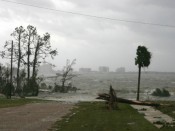 Tropical Storm Isaac spun out of control and landed on the Gulf Coast earlier this week. Disasters—natural or man-made—can strike quickly and with little warning. While protecting your home and your assets, it’s important to remember to protect your financial security. NEFE offers these tips to ensure you and your family are financially prepared for an impending disaster.
Tropical Storm Isaac spun out of control and landed on the Gulf Coast earlier this week. Disasters—natural or man-made—can strike quickly and with little warning. While protecting your home and your assets, it’s important to remember to protect your financial security. NEFE offers these tips to ensure you and your family are financially prepared for an impending disaster.
Protect Your Health and Life
Above all, the most important thing to consider in preparing for a disaster is to protect your loved ones. Be sure to have a disaster plan in place for your family. As part of your family’s disaster plan be sure that:
- Everyone knows the safest place in the home to seek shelter, and if needed, each person knows how to shut off the supply to utilities.
- You have an evacuation drill in place, and that your family has practiced it.
- If separated, you have identified a meeting location outside the home.
- You have assembled a kit to care for your pets, including food, water and medication needs.
Protect Your Property
Even when you take steps to protect your property, there always is the possibility that you still could experience damage. That’s why it is important for homeowners and renters alike to have an insurance policy in place. Some things to consider:
- At a minimum, buy full-replacement insurance. In this case the insurance company will pay to replace the residence up to the coverage amounts specified in the policy.
- Have your property appraised periodically to ensure that you are keeping adequate insurance coverage.
- Have a policy in place that will cover the replacement of your possessions.
Protect Your Records
Protect important documents by storing them in a safe deposit box at a financial institution—for an annual cost of about $30—or in a safe at home. These papers should be items that are difficult to replace, such as birth, death and marriage certificates; Social Security cards; loan paperwork; and insurance policies.
Protect Your Job and Income
If you are unable to work because of a disaster-related injury, or if your employer is forced to temporarily close due to a crisis, how will you manage financially? Check with your employer, through a human resources representative or through an Employee Assistance Program (EAP), to learn about your company’s plan in the event of an emergency.
You also may be able to take advantage of the Family and Medical Leave Act if you are unable to return to work in the near future because you are caring for an injured family member. Learn more by visiting the U.S. Department of Labor’s website at www.dol.gov.
Remember Immediate Needs
One of the first things you may need in the event of a disaster is food, shelter, etc. Be prepared with a predetermined amount of cash and keep it accessible. Also, know where and how you can access larger amounts of cash if needed as ATMs may be affected by the disaster. If you need emergency access to money, you may contact the Red Cross or the Federal Emergency Management Agency (FEMA). One of these organizations might be able to guide you to sources of emergency cash assistance. You also might contact your employer and request an advance on your next paycheck.
For more tips on financially preparing for an impending disaster, visit www.smartaboutmoney.org.











